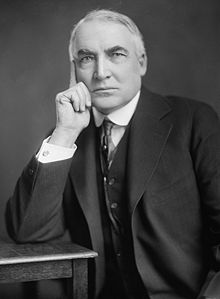
Back رئاسة وارن جي. هاردينغ Arabic Kabinett Harding German Présidence de Warren G. Harding French הקבינט של ארצות הברית בממשל וורן הרדינג HE Presidenza di Warren G. Harding Italian Kabinet-Harding Dutch
 | |
| Presidency of Warren G. Harding March 4, 1921 – August 2, 1923 | |
| Cabinet | See list |
|---|---|
| Party | Republican |
| Election | 1920 |
| Seat | White House |
|
| |
Warren G. Harding's tenure as the 29th president of the United States lasted from March 4, 1921, until his death on August 2, 1923. Harding presided over the country in the aftermath of World War I. A Republican from Ohio, Harding held office during a period in American political history from the mid-1890s to 1932 that was generally dominated by his party. He died of an apparent heart attack and was succeeded by Vice President Calvin Coolidge.
Harding took office after defeating Democrat James M. Cox in the 1920 presidential election. Running against the policies of incumbent Democratic President Woodrow Wilson, Harding won the popular vote by a margin of 26.2 percentage points, which remains the largest popular-vote percentage margin in presidential elections since the end of the Era of Good Feelings in the 1820s. Upon taking office, Harding instituted conservative policies designed to minimize the government's role in the economy. Secretary of the Treasury Andrew Mellon won passage of the Revenue Act of 1921, a major tax cut that primarily reduced taxes on the wealthy. Harding also signed the Budget and Accounting Act, which established the country's first formal budgeting process and created the Bureau of the Budget. Another major aspect of his domestic policy was the Fordney–McCumber Tariff, which greatly increased tariff rates.
Harding supported the 1921 Emergency Quota Act, which marked the start of a period of restrictive immigration policies. He vetoed a bill designed to give a bonus to World War I veterans but presided over the creation of the Veterans Bureau. He also signed into law several bills designed to address the farm crisis and, along with Secretary of Commerce Herbert Hoover, promoted new technologies like the radio and aviation. Harding's foreign policy was directed by Secretary of State Charles Evans Hughes. Hughes's major foreign policy achievement was the Washington Naval Conference of 1921–1922, in which the world's major naval powers agreed on a naval disarmament program. Harding appointed four Supreme Court justices, all of whom became conservative members of the Taft Court. Shortly after Harding's death, several major scandals emerged, including the Teapot Dome scandal.
Harding died as one of the most popular presidents in history, but the subsequent exposure of the scandals eroded his popular regard, as did revelations of several extramarital affairs. In historical rankings of the U.S. presidents during the decades after his term in office, Harding was often rated among the worst. However, in recent decades, many historians have begun to fundamentally reassess the conventional views of Harding's historical record in office.
| ||
|---|---|---|
|
Political rise
29th President of the United States
Presidential campaigns
Controversies
 |
||

